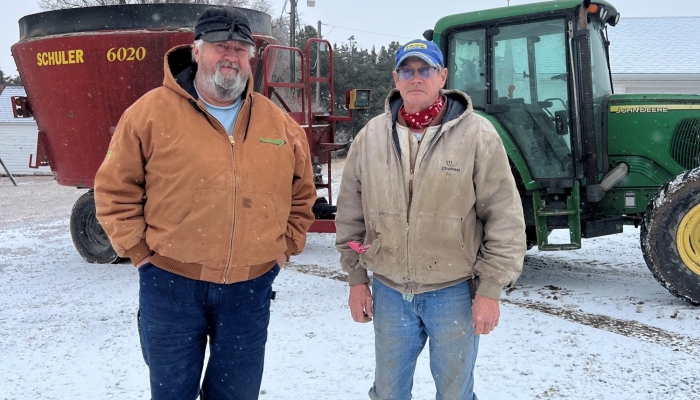Saving their Soil
Brothers Invest in Erosion Prevention with Help from NRD & NRCS
For Butler County farmers Dave and Dan Rech, utilizing cost-share dollars to improve their farming operation over the past few decades has been a simple action with big impact. The Rechs have worked with the Upper Big Blue Natural Resources District (NRD) and the Natural Resources Conservation Service (NRCS) to add terraces and outlets to their row crop acres. Erosion control was their primary objective, as they were seeing significant soil loss on their hillier acres.
“With terraces, tiled outlets, and no-till farming, we can pretty much eliminate erosion,” said Dave. In addition to keeping the topsoil, adding these measures has also made farming easier in places. “If you get these terraces in and you control that erosion, you’re eliminating a lot of ditches to cross,” he said.
It’s been a long-term project to install these upgrades. The Rechs were committed to making the land improvements happen a little at a time, each year making use of the maximum cost-share dollars. Previously the maximum amount available for cost-share for land treatment practices with the NRD was $5,000 per year per landowner. The amount has since been increased to $7,500.
“Over the last 40-some years, most every part of our land that needed some treatment, got it,” Dave said. “It’s been a lifelong battle. You do a little bit every year, and that’s how you get things done.” Dave has been farming with his brother for many years and today both men’s sons have also joined the operation. Dave is pleased that when it is time to turn over the farm to the next generation someday in the future, that he will have done his part to make the land as profitable and sustainable as possible.
The Rechs have been experimenting with cover crops to further reduce erosion and to improve soil health. They currently have rye as a cover crop on about 25 percent of their row crop acres and plan to plant more in the next five years. They have a cow-calf operation of about 400 head and the rye provides early spring grazing for the cattle. In the winter, the cattle graze crop residue, which Dave says is the most cost-effective way to fatten the cows and build the soil. Twenty years ago, when he went no-till then started planting cover crops, Dave says he caught some flak from other producers in his area who thought his fields were full of “trash.” As his strategy has proven successful, his nay-sayers have started following his lead. Now the practices are becoming much more common in his area, he said.
“There are still some people that do full tillage. They’re not happy unless they are stirring dirt somewhere. They call it recreational tillage,” Dave said. However, the labor and cost savings involved with no-till makes the practice a bedrock of the Rechs’ operation. “We used to work up the soil once or twice, but now we just go out there and plant and we’re getting good stands and raising good crops,” he said.
These practices have provided a measure of protection for the Rechs’ farm when it comes to weather extremes like the wind, hailstorms, and drought Nebraska experienced in the 2022 growing season. “It’s hard to prepare yourself for something like that,” Dave said, referencing the storms. “I’ve never seen so much damage and destruction. Up and down Interstate 80…it was just terrible.”
After all that wild weather, Dave said he could see the impact of conservation activities at harvest: on ground that had been more recently tilled, he saw a 40 bushel per acre yield hit. “The difference really showed up,” he said. Better soil structure and keeping the ground covered provided a buffer against the drought.
“It’s hard to fight Mother Nature,” Dave conceded. “You think you’ve got it figured out and Mother Nature throws a whammy at you and then you’ve got to rethink. Hailstorms, drought, you never know what you’re going to be up against from one year to the next.” With the help of the NRD and NRCS, the Rechs’ operation is better prepared for whatever Mother Nature might throw at them next.
Interested in land treatment cost-share? See what the NRD has to offer.

